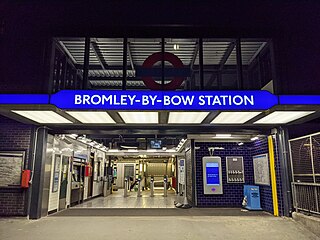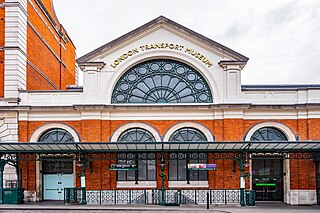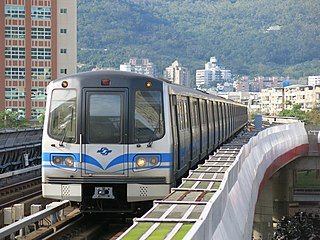
The history of public transport authorities in London details the various organisations that have been responsible for the public transport network in and around London, England - including buses, coaches, trams, trolleybuses, Docklands Light Railway, and the London Underground.

Transport for London (TfL) is a local government body responsible for most of the transport network in London, United Kingdom.

Transport in the United Kingdom is highly facilitated by road, rail, air and water networks. Transport is a devolved matter with each of the countries of the United Kingdom having separate systems under separate governments.

Transport in Europe provides for the movement needs of over 700 million people and associated freight.

Ealing Broadway is a major single-level interchange station located in Ealing, in the London Borough of Ealing, West London for London Underground services and also Elizabeth line services on the National Rail Great Western Main Line.

The 2004 election to the post of Mayor of London took place on 10 June 2004. It was being held on the same day as other local elections and the UK part of the 2004 European Parliament elections, so Londoners had a total of five votes on three ballot papers. Polling opened at 07:00 local time, and closed at 22:00. See: 2004 UK elections. The Supplementary Vote system was used.

The National Union of Rail, Maritime and Transport Workers is a British trade union covering the transport sector. Its current President is Alex Gordon and its current General Secretary is Mick Lynch.

Wimbledon is an interchange station located on Wimbledon Bridge, Wimbledon in London for London Underground, London Trams and National Rail services, and is the only station in London that provides an interchange between the London Underground and Tramlink.

Bromley-by-Bow is a London Underground station located on the Blackwall Tunnel Northern Approach Road in the Bromley-by-Bow area of London, United Kingdom. The station is below the Blackwall Tunnel Northern Approach Road and lies between Bow Road and West Ham stations on the District and Hammersmith & City lines, and is in both Travelcard Zones 2 and 3.

Westbourne Park is a London Underground station in the Notting Hill area of the Royal Borough of Kensington and Chelsea. It is on the Circle and Hammersmith and City lines, between Ladbroke Grove and Royal Oak stations, and is in Travelcard Zone 2.

The London Transport Museum (LTM) is a transport museum based in Covent Garden, London. The museum predominantly hosts exhibits relating to the heritage of London's transport, as well as conserving and explaining the history of it. The majority of the museum's exhibits originated in the collections of London Transport, but, since the creation of Transport for London (TfL) in 2000, the remit of the museum has expanded to cover all aspects of transport in the city and in some instances beyond.

Southfields is a London Underground station in Southfields in the London Borough of Wandsworth. The station is on the District line between East Putney and Wimbledon Park stations. The station is located on Wimbledon Park Road at the junction with Augustus Road and Replingham Road. It is in Travelcard Zone 3.
The London Cycling Campaign (LCC) is an independent membership charity lobbying for better conditions for cycling in London. Its vision is to make London "a world-class cycling city". It is one of the largest urban cycling organisations in the world, with over 11,000 members.

England has a dense, multimodal transportation infrastructure. The Department for Transport is the government department responsible for the transport network in England. The Secretary of State for Transport is the member of the cabinet responsible to Parliament for the Department for Transport.
The RAC Foundation is a registered charity.

London has an extensive and developed transport network which includes both public and private services. Journeys made by public transport systems account for 37% of London's journeys while private services accounted for 36% of journeys, walking 24% and cycling 2%,according to numbers from 2017. London's public transport network serves as the central hub for the United Kingdom in rail, air and road transport.
London Regional Transport (LRT) was the organisation responsible for most of the public transport network in London, England, between 1984 and 2000. In common with all London transport authorities from 1933 to 2000, the public name and operational brand of the organisation was London Transport from 1989, but until then it traded as LRT. This policy was reversed after the appointment of Sir Wilfrid Newton in 1989, who also abolished the recently devised LRT logo and restored the traditional roundel.
The North and West London Light Railway (NWLLR), formerly known as the Brent Cross Railway, was a proposal for a light rail system in North and West London in the UK. It was put forward by the London group of the Campaign for Better Transport and by the Coalition for a Sustainable Brent Cross Cricklewood.

Public transport is a system of transport for passengers by group travel systems available for use by the general public unlike private transport, typically managed on a schedule, operated on established routes, and that may charge a posted fee for each trip. There is no rigid definition of which kinds of transport are included, and air travel is often not thought of when discussing public transport—dictionaries use wording like "buses, trains, etc." Examples of public transport include city buses, trolleybuses, trams and passenger trains, rapid transit and ferries. Public transport between cities is dominated by airlines, coaches, and intercity rail. High-speed rail networks are being developed in many parts of the world.
















